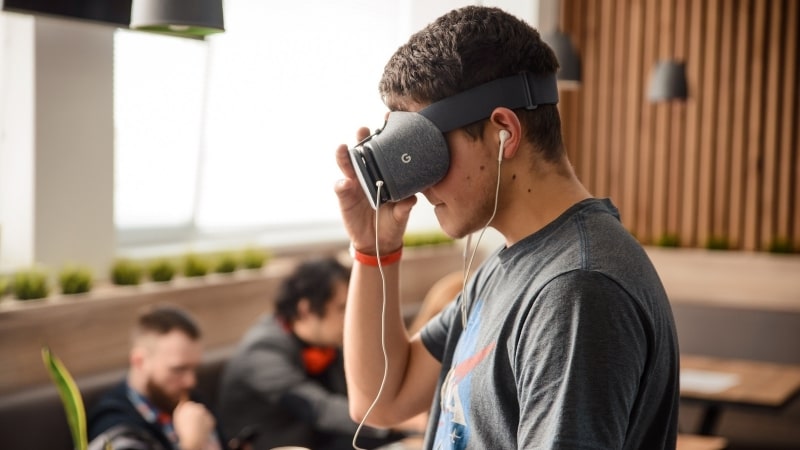 Photo: DataArt
Photo: DataArtThis year will see further integration of new technologies, entertainment, and social media, DataArt experts predict. A key factor will be the development of 5G networks, enabling a new level of connectivity with instant access to content anytime and anywhere. This technology is expected to bolster an industry already moving toward on-demand services, potentially equating subscription revenues with advertising revenues - even in areas traditionally dominated by ads.
Personalization Will Be Key
This trend will drive the exponential growth of the value of intellectual property in media, music, and sports. While industry giants like Netflix, Amazon, Google, Facebook, and Apple will maintain their dominance, other players will need to carve out niches with well-defined products, personalized microservices, and unique offerings. This challenge may lead to increased competition or market consolidation.
The competition for market share will intensify, with technology serving as the critical tool for success. Personalization of content, as demonstrated by Netflix, will be crucial. For example, Bloomberg reported in October that Netflix`s new season of "Black Mirror" would allow viewers to decide on the storyline or ending of each episode - a concept borrowed from video games that could soon become a staple on the "silver screen."
Personalization vs. Compliance
Challenges related to data security and privacy regulations will complicate this battle. Personalization can only thrive within legal boundaries and users` willingness to share information. While technology expands the possibilities for personalization, regulations may impose limitations. Compliance becomes even more challenging with new laws that not only change legal frameworks but also impact trust between companies and consumers.
Those who overcome these challenges will be able to focus on intelligent data collection, analysis, and visualization - key factors for success in content creation, distribution, and monetization.
AI, VR, AR
Artificial intelligence is likely to play a significant role in this transformation. AI will enhance personalized advertising, content recommendations, and even content creation. Virtual assistants, combining analytical and communication skills, are emerging as promising tools for creating more personalized and human-like interactions.
Technologies like virtual and augmented reality, along with 360-degree images and videos, will further personalize experiences by enabling consumers to create virtual environments from scratch. VR and AR are already making their way into entertainment, sports, journalism, and education.
Shifting Revenue Structures
A shift in the revenue structure of the industry will be another indicator of this evolution. Historically, two-thirds of revenues came from hardware. However, as technology becomes more advanced and accessible, software is poised to take a larger share of growth. Augmented reality technologies are set to outpace virtual reality, making AR the dominant segment in the near future.
COMMERCIAL BREAK
New articles in section Media industry
Freelancers 2025 in media and advertising. Useme report
Krzysztof Fiedorek
The modern media and communication market presents entirely new challenges for independent creators. Traditional services are giving way to more complex forms of messaging. The most popular industries in which Polish freelancers operate focus on companies' online presence and visual content.
Video content in Poland. What and how we watch
Paweł Sobczak
Video content is watched remotely, but streaming services are mainly enjoyed in the comfort of home. This is how the consumption of audiovisual content by Poles in 2025 can be summarized. This is the result of an analysis of a study conducted by SW Research and data from the company MEGOGO.
How artificial intelligence misrepresents the news. PBC analysis
Sylwia Markowska
In news summaries generated by the most popular models in Polish, as many as 46% of responses contained at least one significant error, 27% had serious issues with sources (missing, misleading, or incorrect), and 19% contained hallucinations and outdated information.
See articles on a similar topic:
Work in the media. We have more recruitment offers at Reporterzy.info [LINK]
AUTOPROMOCJA Reporterzy.info
Thanks to cooperation with the recruitment website Talent.com, the database of recruitment advertisements published in Reporterzy.info has been significantly enriched. We invite you to browse current job offers and internships in the media and advertising industry from the largest Polish cities.
Television 2025. Report by the European Broadcasting Union
Krzysztof Fiedorek
Europeans are watching less and less television. In 2024, the average viewing time was 3 hours and 13 minutes per day. Only 54% of young people had any contact with TV, and public broadcasters held a 23% share. Television is losing relevance, especially among the youngest viewers.
Artificial Intelligence is ALREADY Outperforming Humans in Creativity
Krzysztof Fiedorek
ChatGPT, an AI model based on the GPT-4 engine, achieved better results than the vast majority of students in the standard Torrance Test of Creative Thinking (TTCT), which evaluates creativity. The study was conducted by researchers from the University of Montana.
Future of Public Media. Who Will Be Data Ethicists and VR Designers?
KFi
How does the future of work in media look? Here are professions that do not yet exist but will soon become essential. The report "Future Jobs at PSM: Competencies and Professions for the Media of Tomorrow," prepared by the European Broadcasting Union (EBU) and Rai Ufficio Studi, outlines key changes awaiting the public media sector in the coming years.





























